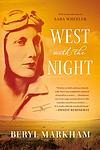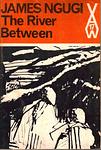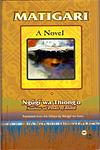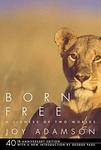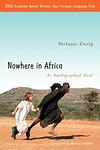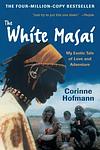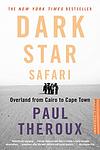The Greatest "Kenya" Books of All Time
Click to learn how this list is calculated.
This list represents a comprehensive and trusted collection of the greatest books. Developed through a specialized algorithm, it brings together 286 'best of' book lists to form a definitive guide to the world's most acclaimed books. For those interested in how these books are chosen, additional details can be found on the rankings page.
Genres
Countries
Date Range
Reading Statistics
Click the button below to see how many of these books you've read!
Download
If you're interested in downloading this list as a CSV file for use in a spreadsheet application, you can easily do so by clicking the button below. Please note that to ensure a manageable file size and faster download, the CSV will include details for only the first 500 books.
Download-
1. Out of Africa by Isak Dinesen
The book is a memoir that recounts the author's experiences and observations living in Kenya, then British East Africa, from 1914 to 1931. It is a lyrical meditation on her life amongst the diverse cultures and wildlife of Africa. The author shares her trials and tribulations of running a coffee plantation, her deep respect for the people and land of Africa, and her intimate understanding of the subtle nuances of African culture and society.
-
2. West With the Night by Beryl Markham
The book is a memoir of a British-born woman who grew up in Kenya during the early 20th century. She recounts her unconventional upbringing, her passion for horses, and her career as a bush pilot. The narrative is filled with vivid descriptions of the African landscape and wildlife, as well as her personal adventures and encounters. The book culminates with her historic solo flight across the Atlantic from east to west.
-
3. A Grain Of Wheat by Ngugi wa Thiong'o
"A Grain of Wheat" is a historical novel set in Kenya during the Mau Mau uprising against British colonial rule. The story follows a diverse cast of characters whose lives are intertwined by secrets, betrayals, and sacrifices. As Kenya prepares for independence, the book explores themes of nationalism, identity, and the complex aftermath of revolution. Through vivid storytelling, the author delves into the complexities of human nature and the struggle for freedom in a turbulent time.
-
4. The Looming Tower by Lawrence Wright
"The Looming Tower" is a comprehensive historical examination of the events leading up to the 9/11 terrorist attacks on the United States. It delves into the origins of Al-Qaeda, the rise of Osama bin Laden, and the failure of U.S. intelligence agencies to prevent the attacks. The narrative is extensively researched and provides a detailed account of Islamic fundamentalism, the complex politics of the Middle East, and the role of the United States in the region. The book also explores the personal stories of key figures on both sides of the conflict.
-
5. Petals of blood by Ngugi wa Thiong'o
This novel tells the story of four characters living in post-colonial Kenya, who are arrested for the murder of three prominent figures in their village. As the narrative unfolds, it explores their personal histories and how they are intertwined with the political, social, and economic transformations of the nation. The book is a critique of the corruption and inequality that emerged in Kenya after the end of colonial rule, and a call for a return to communal values and practices.
-
6. The River Between by Ngugi wa Thiong'o
"The River Between" explores the lives of the Gikuyu people living in the Kenyan highlands during the early days of white settlement. The novel focuses on the struggle between two villages, each with differing views on the encroaching influence of the Christian missionaries. The protagonist, a young man torn between the traditional values of his people and the new ideas brought by the missionaries, serves as a symbol of the larger conflict. The narrative delves into themes of love, cultural identity, religious conflict, and the struggle for independence.
-
7. Matigari by Ngugi wa Thiong'o
"Matigari" is a novel set in a post-colonial African nation, where the protagonist, who is a freedom fighter, emerges from the forest after the country's liberation, intent on finding justice and peace. However, he finds a society still deeply entrenched in corruption and oppression. The narrative uses allegory and symbolism to explore themes of justice, truth, and the fight against inequality. The protagonist's quest for justice becomes a threat to the government, leading to a manhunt for a man who is merely a myth.
-
8. The Flame Trees Of Thika by Elspeth Huxley
The book is a vivid memoir that recounts the author's childhood experiences in colonial Kenya during the early 20th century. Through the eyes of a young girl, it captures the pioneering spirit of her parents as they establish a coffee farm in the untamed highlands of East Africa. The narrative is rich with descriptions of the stunning landscapes, the diverse cultures of the local tribes, and the various colonial characters who are trying to make their fortunes on the frontier. The memoir is both a coming-of-age story and a portrayal of a bygone era, marked by challenges, adventures, and the complexities of cultural interactions during the period of British colonial rule.
-
9. Facing Mount Kenya by Jomo Kenyatta
"Facing Mount Kenya" is a comprehensive study of the Kikuyu people, their history, culture, and traditions, written by Jomo Kenyatta, a prominent figure in Kenya's struggle for independence. The book explores various aspects of Kikuyu society, including their political organization, economic activities, social structure, and religious beliefs. Kenyatta's work provides valuable insights into the Kikuyu way of life and offers a critical analysis of the impact of colonialism on their society.
-
10. The Constant Gardener by John le Carré
"The Constant Gardener" is a gripping tale of corporate corruption and its impact on the world's most vulnerable people. The story follows a British diplomat who embarks on a dangerous journey to find the truth behind his wife's murder. As he uncovers layers of deceit, he discovers that she was close to exposing a conspiracy involving a pharmaceutical company testing a dangerous drug on unsuspecting African villages. The novel explores themes of love, loss, and the lengths one man will go to seek justice.
-
11. Caitaani Mutharaba Ini by Ngugi wa Thiong'o
"Caitaani Mutharaba Ini" is a captivating novel that explores the complexities of human nature and the consequences of one's actions. Set in a small African village, the story follows the lives of various characters who are entangled in a web of love, betrayal, and power struggles. As the narrative unfolds, the book delves into themes of corruption, greed, and the clash between tradition and modernity, offering a thought-provoking reflection on the challenges faced by individuals in a rapidly changing society.
-
12. No Picnic on Mount Kenya by Felice Benuzzi
This book is a true story about three Italian prisoners of war in British East Africa during World War II who escape from their POW camp to climb Mount Kenya, Africa's second highest mountain. The narrative is not only about their audacious adventure, but also about the power of the human spirit, camaraderie, and the freedom of the wild. After their climb, they voluntarily return to their POW camp, where they are punished but also celebrated for their incredible feat.
-
13. Sage Philosophy by Henry Odera Oruka
"Sage Philosophy" explores the rich philosophical traditions of Africa, particularly focusing on the oral traditions of the Luo community of Kenya. The book challenges the conventional view that Africa lacks its own indigenous philosophy by documenting and analyzing the thoughts and teachings of various African sages, who are wise and respected figures within their communities. Through interviews and discussions, the author presents a comprehensive examination of their philosophical perspectives, arguing that these individuals engage in critical reflection and rational argumentation akin to their Western counterparts. The work emphasizes the importance of recognizing and preserving these intellectual traditions as a vital part of Africa's cultural heritage.
-
14. Green City In The Sun by Barbara Wood
Set against the backdrop of colonial Kenya, the novel is a sweeping saga that explores the intertwined lives of two families—one British and one Kikuyu—over several decades. As the British family establishes a vast estate and hospital in the Kenyan highlands, their presence and actions deeply affect the local Kikuyu people. The story delves into themes of colonialism, cultural conflict, love, betrayal, and the struggle for power. As the characters navigate personal and political upheavals, the narrative reveals the complexities of race relations and the impact of colonial rule on both the land and its people, culminating in a dramatic and emotional conclusion that reflects the broader historical changes taking place in the region.
-
15. Kiswahili, Past, Present And Future Horizons by Rocha Chimera
"Kiswahili, Past, Present And Future Horizons" explores the rich history, current state, and potential future of the Kiswahili language. The book delves into the origins and development of Kiswahili, highlighting its significance as a lingua franca in East Africa. It examines the language's role in literature, education, and communication, while also addressing the challenges and opportunities it faces in a rapidly changing global landscape. Through insightful analysis and compelling examples, the author presents a comprehensive overview of Kiswahili's past achievements and its promising prospects for continued growth and influence.
-
16. Born Free by Joy Adamson
The book tells the true story of Elsa, a lioness raised by a game warden and his wife after being orphaned as a cub. Unlike other lions raised in captivity, Elsa is taught how to survive in the wild. The narrative beautifully captures the deep bond that forms between Elsa and her human caretakers, as well as the emotional struggle they face as they prepare to release her into her natural habitat, aiming to grant her freedom while fearing for her survival. The story is a poignant exploration of the complex relationship between humans and animals, and the moral implications of their interactions.
-
17. Nowhere In Africa by Stefanie Zweig
"Nowhere in Africa" is not a book by Stefan Zweig, but rather a novel by Stefanie Zweig. It is an autobiographical narrative that tells the story of a Jewish family who flees Nazi Germany in the 1930s to find refuge in Kenya. The story explores their struggles and adjustments to a vastly different life on an African farm, dealing with the challenges of displacement, cultural adaptation, and the complexities of maintaining their identity amidst the backdrop of World War II. The novel delves into themes of exile, belonging, and resilience as the family navigates their new reality while yearning for the home they left behind.
-
18. The White Masai by Corinne Hofmann
The book is a true story of a Swiss woman who, while on holiday in Kenya, falls in love with a Samburu warrior. Defying her family, friends, and cultural norms, she decides to leave her life in Switzerland behind to marry him and live in his remote village. The narrative delves into her challenging and transformative journey as she adapts to a vastly different culture, learns the local customs, and navigates the complexities of her interracial marriage and the community's expectations. Her story is one of love, resilience, and the pursuit of happiness in the face of extraordinary cultural differences.
-
19. The Short Happy Life of Francis Macomber by Ernest Hemingway
"The Short Happy Life of Francis Macomber" is a story about a wealthy American man who, while on a safari in Africa, gains courage and personal growth after initially behaving in a cowardly manner when faced with danger. This transformation, however, leads to his wife killing him, possibly accidentally, out of fear that his newfound courage would end their marriage. The narrative explores themes of courage, masculinity, and the dynamics of power in relationships.
-
20. Dark Star Safari by Paul Theroux
In this travel memoir, the author recounts an overland journey across Africa, starting from Cairo and ending in Cape Town. Along the way, he traverses a continent rich with diverse cultures, landscapes, and histories, while also confronting the stark realities of poverty, political turmoil, and the complex legacies of colonialism. His encounters with aid workers, missionaries, and locals provide a nuanced perspective on the challenges and beauty of Africa, as well as a critical look at the effects of foreign aid and development. The narrative is a blend of adventure, reflection, and social commentary, revealing the author's deep fascination with the continent and its people.
-
21. The End Of Poverty by Jeffrey D. Sachs
This book presents a compelling argument that extreme poverty, defined as living on less than $1 a day, can be eradicated globally by the year 2025 through targeted interventions and international cooperation. The author, an esteemed economist, draws on his extensive experience advising governments in Latin America, Eastern Europe, and Africa to outline a practical plan for achieving this goal. He emphasizes the importance of addressing the "poverty trap" that many developing countries find themselves in, where low income leads to insufficient investment in basic needs such as health, education, and infrastructure, which in turn keeps these nations in a cycle of poverty. The book advocates for a combination of increased aid, debt relief, and investment in technology and infrastructure, tailored to the specific needs of impoverished regions, to empower these communities to achieve sustainable economic growth.
-
22. Say You’re One of Them by Uwem Akpan
"Say You're One of Them" is a collection of five stories, each set in a different African country, that provides a heart-wrenching look into the lives of children trying to survive in the face of unimaginable hardship. The stories deal with issues such as child trafficking, religious conflict, and poverty, presenting the harsh realities of life in Africa through the innocent eyes of children. The book is a powerful exploration of the resilience and hope of these children in the face of adversity.
-
23. Desertion by Abdulrazak Gurnah
"Desertion" is a novel that intertwines two love stories set in East Africa, spanning the mid-20th century. The narrative begins with the taboo romance between a British colonial official and a local woman in the 1890s, a relationship that is abruptly severed, leaving a legacy of silence and pain. The story then shifts to the 1950s, where the impact of the earlier affair resonates through the lives of new characters, revealing the complexities of love, race, and betrayal against the backdrop of a society in the throes of political and social upheaval. The novel explores themes of cultural collision, the enduring consequences of personal choices, and the intricate tapestry of human connections that shape individual destinies and collective histories.
-
24. I Married Adventure by Osa Johnson
"I Married Adventure" is an autobiographical account of the author's life and travels with her husband, as they explored and documented wildlife and indigenous cultures in Africa, Borneo, and the South Seas during the early 20th century. The book is filled with thrilling adventures, dangerous encounters with wild animals, and fascinating insights into tribal cultures, all captured through the lens of their camera. The author's courage, resilience, and love for adventure shine through, making it an inspiring and captivating read.
-
25. Poor Economics by Abhijit V. Banerjee, Esther Duflo
This book delves into the complex world of poverty, challenging conventional wisdom and assumptions about the economic decisions of the poor. Through rigorous analysis and empirical evidence, the authors explore how the poor make choices regarding education, health care, savings, and investments, revealing the logic behind these decisions. They argue that understanding these choices is crucial for designing effective anti-poverty policies. The book advocates for a more nuanced, bottom-up approach to economics, emphasizing the importance of specific, targeted interventions over broad, one-size-fits-all solutions. By combining detailed field research with economic theory, it provides insightful perspectives on how to empower the world's impoverished populations.
Reading Statistics
Click the button below to see how many of these books you've read!
Download
If you're interested in downloading this list as a CSV file for use in a spreadsheet application, you can easily do so by clicking the button below. Please note that to ensure a manageable file size and faster download, the CSV will include details for only the first 500 books.
Download
